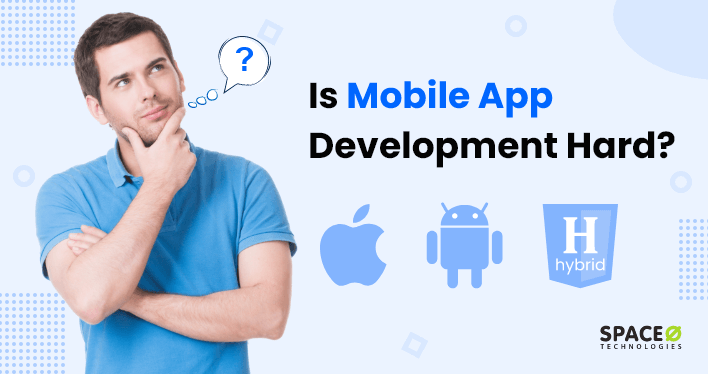Is Mobile App Development Hard?
The answer is both- yes and no.
We will start by answering why we said no.
To answer your question, is app development hard? If you know the mobile app development process and have the path defined, things are not so challenging.
Apart from that, app developers get a $5000 cash bonus per year according to Indeed.
-
-
Programming Multiple Sensors
You create a mobile app using multiple mobile devices and sensors. The application will help the devices communicate with other hardware and sensors over the internet connection.
Now, imagine the sensor is not working when the mobile app is fired up, it can cause friction in experiences. The user might think the app is not working if you don’t let them know the device has issues.
Similarly, network connectivity plays a pivotal role in ensuring that the device is connected over the active Internet connection with the mobile app.
As a mobile app developer, you need to define multiple scenarios for every logic and program. This will help you ensure that the app is ready for all cases.
-
Device Fragmentation
Most developers fear this part of the app development process. When you are developing for Android, the multiple devices differ in size, form factor, and resolution. You are dealing with countless devices.
So, what’s the challenge? You need to make sure that the experience of using the app across these devices remains similar. Whether the person is using the application on the latest One Plus device or a Samsung tablet, they should be able to note the uniformity.
This leads to developing multiple resolutions and testing them out. It means a great deal of work with no room for error.
The chances of bugs attracting your workspace are high. Add to Android, your iOS, and other devices, you have a whole load of work to worry about.
-
OS Versions
While we are talking about device fragmentation, we cannot ignore the specific mobile operating system and SDK upgrades. As of Dec 2022, Android 12.0 has covered 28.22% of the market share. There is a lot of fragmentation here. For instance, the same application can work on the older and newer version of a single operating system.
The challenge that most mobile app developers face is ensuring support for the older versions. That can take up a lot of your time.
This adds up the word and increases the average time to build a mobile application.
-
Flexibility or Rigidity with SDK
While SDKs have made programming fast and easy for developers, there is a certain level of rigidity that comes with the SDK. You cannot introduce the touch or swipe outside their ability. If you want to use movements that aren’t part of the SDK, it can become difficult.
With SDK, the transition between screens requires extra work and logic. As a result, despite SDKs offering accelerated software development, they tend to bring in rigidity.
-
Knowledge of Programming Languages
Choosing a programming language depends a lot on the approach you plan to take for mobile app development. For example, if you are planning native applications, you can do both Android and iOS app development. For Android apps, you need proficiency in Kotlin and Java. You should know how to work with Android Studio.
On the other hand, if you are developing with iOS, you should be proficient with Objective-C and swift.
In case you are planning to develop for multiple platforms, you should know how to use top mobile app development frameworks. This can add to the complexity of hiring. Without direction, you are like a raging bull walking everywhere they see red. Unlike web-based frameworks that work on browser-supported languages, mobile applications need specific coding skills and framework understanding.
Want to Develop Custom Mobile App?
Consult with our app developer for 30 mins, share your requirements, and develop a fully functional app.
-
Frustrated End Users
Despite the best development efforts, you will find yourself tied up with frustrated users, who are ready to churn away. They want nothing more than to leave your app behind.
In many cases, developers do not regard mobile app users as important when building solutions. There are solutions where the customer needs more than what you have provided. They may try reaching out but, with no response, it can lead to abandonment.
This has led many app developers to a stage of frustration. A poor experience, limited features, and a high learning curve can put your customers off, and in turn, make app development difficult
-
Need for Multithreading
When you are developing a mobile application, you aren’t creating it for a single type of user. Your user varies in their usage, needs, and even behavior. As part of the software architecture, you are not just multithreading the application for the different users but also multiple requests.
Each component and logic has to be multithreaded using the rigidity of the framework. As a result, you will notice that the time is taken to develop the application increases. It also results in more work and frustration. Unlike desktop or web apps, mobile apps require more time and effort.
-
Ultranet –
For enquiries on any of our expertise or services, whether it is for website design & development, mobile application development, or digital media marketing, please feel free to contact or WhatsApp +6016-2032 000, email [email protected] or visit https://ultranet.com.my Thank you.




